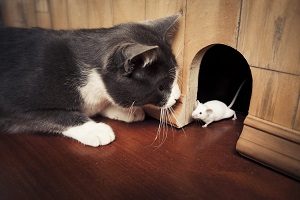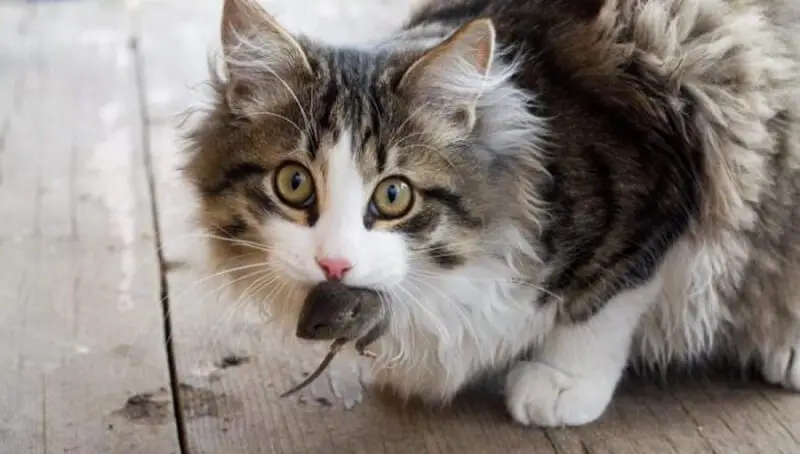The cat became the first animal that humans tamed since ancient times. Her hunting instinct didn’t go unnoticed. She regularly catches rodents around the house and land holdings. The animal became man’s friend, companion, family member, and weapon against mice, and rats. The question of whether cats eat mice or just catch them is asked by many owners after many unusual discoveries around the house. The hunter brings the prey to the owners, shows it as a trophy, or leaves it in a visible place.
Are cats prey animals?
Cats are predators by excellence. They are part of the feline class, which includes larger relatives such as lions, leopards, tigers, pumas, etc. We all know that these are skillful hunters who do not step aside from hunting almost any prey. Keeping the proportions, if lions hunt antelopes, cats hunt prey smaller than them. Thus, the range of small animals that can be hunted by the cat is reduced to small mammals, like rodents and small birds.
Since birds are hard to catch because they are vigilant and take flight quickly, the most accessible prey for cats are small rodents. Among these small rodents, the most widespread and easy to catch are house or field mice. Rats are also possible prey for cats, but due to their larger size and aggression, they are bypassed by most cats.
You might also like my articles about whether cats can eat garlic, oats, or raspberry.
A cat can sit for hours in front of a mouse hole until the little one comes out. It takes a lot of patience and control to last so long, motionless and always focused. As soon as the mouse comes out of the nest the cat will jump on it and with the help of whiskers will know exactly where to grab it to succeed in her attack.
Unfortunately, a low percentage of hunts lead to a positive result for the cat. But the mice being numerous and the cat’s hunting thirst big, the feline will not remain hungry for even a day.
Cats love to play with their prey, which is why they do not end the mouse’s life first but take it in a game of “cat and mouse”, in which the little rodent is chased from side to side. In this way, the kittens learn to hunt, as their mother brings them a mouse and allows them to play with it under her close supervision.
Why does a cat eat mice?
When asked why cats eat mice, most people will tell you that this happens because they are hungry. The situation in which a skinny cat sees a lifeless rodent and does not rush to touch it has destroyed this myth. Then why does the cat eat a mouse?
The nature of the bond between cats and rodents is inextricable. There are many useful microelements in the skin of the mouse, especially sulfur. Sulfur is a component of cystine and methionine. They are necessary for the full development of the cat’s body and well-being. The components are responsible for the health, beautiful coat, and mood of the cat. Meat should be part of the daily diet, especially because they are carnivorous.
Why shouldn’t a cat eat mice?
 Although it seems so natural for the cat to eat mice, many specialists disagree with this habit. This is because house mice, but especially those in the field, carry numerous diseases that can be transmitted to the cat, and then even to humans. It is risky for an unvaccinated cat, and even more for a regular home cat, to feed on mice.
Although it seems so natural for the cat to eat mice, many specialists disagree with this habit. This is because house mice, but especially those in the field, carry numerous diseases that can be transmitted to the cat, and then even to humans. It is risky for an unvaccinated cat, and even more for a regular home cat, to feed on mice.
You will probably say that your grandparents’ cats from the countryside never suffered from diseases. Most likely they were not given that much attention, and in addition, the cat raised in that environment built a stronger immunity. The safest thing to do for an indoor cat is to keep it in the house. Besides the risk of mice carrying disease, there are other dangers for these cats that are not well adapted to the outside world.
Hantavirus is often worn by mice and transmitted to cats that eat them. This virus causes a very serious lung syndrome, which can also affect the person who comes in contact with the sick cat or mice brought by it.
Toxoplasmosis is another condition often found in cat owners, which mainly affects pregnant women. The parasite is contracted by the cat from its favorite prey, mice, and transmitted through human feces and secretions.
Bacteria such as Salmonella, Yersinia, or Rickettsia choose as hosts, mice, which then transmit them directly or through the cat to humans. They cause severe conditions, both in people and felines.
How to prevent cats from eating mice
Maybe it sounds weird that a cat isn’t allowed to eat mice. These are two components of the same chain. Cats should eat rodents in the wild, but they live in the house and often go outside. In modern conditions, there are several risks pets must be protected from.
- Do not allow cats to eat mice if there is a probability of intoxication. If the neighbors use poison to fight the rodents, the cat can receive a dose of poison from the mice.
- The cat should regularly receive medication or other types of parasite control against helminths, fleas, and ticks. Rodents are the main distributors of parasites, so the pet should be protected.
- All routine vaccinations are required as mice spread many terrible diseases. Some of them are transmitted to humans through pets after contact with the mouse.
Cats have a pronounced hunting instinct, which is why a cat and a mouse rarely become good friends. However, a cat raised since she was a kitten with a rodent will accept it as a friend and not as prey. But, sometimes it can happen that during play certain hunter instincts are reactivated and then everything ends badly for the rodent.
Never leave a cat with a rodent unattended. When presenting a mouse to a cat, perform this process gradually, first with the mouse locked in a cage and offering rewards to cats whenever they behave appropriately. When she wants to attack, distract her. You can only get acceptance from the cat, but never a friendly relationship between the two of them. However, there are some cases where it seems that the two get along very well and are happy together, which differs from cat to cat, and from mouse to mouse.
Cats eat mice, but not all. Yard cats are able to perform fierce hunting against rodents from the age of 5 months. This requires not only hunting instincts but also certain living conditions.




